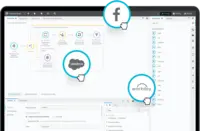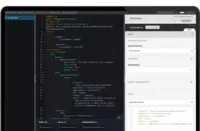Overview
What is Anypoint Platform?
The Anypoint Platform developed by MuleSoft and acquired by Salesforce in early 2018 is designed to connect apps, data, and devices anywhere, on-premises or in the cloud. This platform was built to offer out-of-the-box connectors as well as tools that architects and…
Recent Reviews
Awards
Products that are considered exceptional by their customers based on a variety of criteria win TrustRadius awards. Learn more about the types of TrustRadius awards to make the best purchase decision. More about TrustRadius Awards
Popular Features
- Pre-built connectors (10)8.888%
- Support for real-time and batch integration (10)8.585%
- Connector modification (10)8.585%
- Data quality services (10)8.383%
Reviewer Pros & Cons
Pricing
Entry-level set up fee?
- No setup fee
Offerings
- Free Trial
- Free/Freemium Version
- Premium Consulting/Integration Services
Would you like us to let the vendor know that you want pricing?
116 people also want pricing
Alternatives Pricing
Product Demos
Chapter 11 : Make SOAP service with MuleSoft Anypoint Platform
YouTube
Chapter 5 : Salesforce Connection in MuleSoft Anypoint Platform
YouTube
Features
Return to navigation
Product Details
- About
- Integrations
- Competitors
- Tech Details
- FAQs
What is Anypoint Platform?
The Anypoint Platform developed by MuleSoft and acquired by Salesforce in early 2018 is designed to connect apps, data, and devices anywhere, on-premises or in the cloud. This platform was built to offer tools that architects and developers can adopt quickly to design, build and manage the entire lifecycle of their APIs, applications, and products.
Anypoint Platform Features
- Supported: Anypoint Management Center
- Supported: Anypoint Design Center
- Supported: Hybrid Deployment
Anypoint Platform Screenshots
Anypoint Platform Integrations
- Salesforce Sales Cloud
- Meta Business Suite
- Workday Business Process Framework
- Workday Financial Management
- Workday Human Capital Management
- Workday Talent Insights
- Oracle Access Management
- Slack
- Zendesk Suite
- MySQL
- Splunk Enterprise
- Zuora
- Drupal
- PayPal Payments Pro
- PostgreSQL
- Oracle Database (legacy)
- Microsoft Dynamics 365
- Google Marketing Platform
- SAP Adaptive Server Enterprise (ASE)
- legacy
Anypoint Platform Competitors
Anypoint Platform Technical Details
| Deployment Types | On-premise, Software as a Service (SaaS), Cloud, or Web-Based |
|---|---|
| Operating Systems | Windows, Linux, Mac |
| Mobile Application | No |
Frequently Asked Questions
The Anypoint Platform developed by MuleSoft and acquired by Salesforce in early 2018 is designed to
connect apps, data, and devices anywhere, on-premises or in the cloud. This platform was built to
offer out-of-the-box connectors as well as tools that architects and developers can adopt quickly to
design, build and manage the entire lifecycle of their APIs, applications, and products.
WSO2 API Manager, WSO2 Enterprise Service Bus, and SnapLogic are common alternatives for Anypoint Platform.
Reviewers rate Monitoring console highest, with a score of 9.
The most common users of Anypoint Platform are from Enterprises (1,001+ employees).










